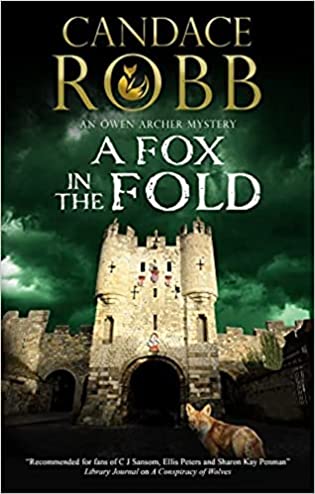 A Fox in the Fold (Owen Archer #14) by Candace Robb
A Fox in the Fold (Owen Archer #14) by Candace Robb Format: eARC
Source: supplied by publisher via NetGalley
Formats available: hardcover, ebook
Genres: historical mystery, mystery
Series: Owen Archer #14
Pages: 256
Published by Severn House on October 4, 2022
Purchasing Info: Author's Website, Publisher's Website, Amazon, Barnes & Noble, Kobo, Bookshop.org, Better World Books
Goodreads
Owen Archer suspects an old adversary is on his tail as he seeks to solve the mystery surrounding a dead body found on the road to York.
October, 1376. Owen Archer is summoned by sheriff Sir Ralph Hastings regarding a stripped and bloodied body discovered on the road north to York. Could it be connected to an attack on a carter and his labourers who were transporting stone destined for St Clement's Priory? The carter fled, but his men stayed to fight and are now missing. Is the victim one of them?
At first Owen believes the catalyst for murder and menace in York is the arrival of the political pariah William Wykeham, Bishop of Winchester. But he soon suspects that a formidable and skillful adversary from his past has arrived in the city, thrusting him and his family into grave danger, and his investigation becomes a race to uncover the truth before his old nemesis destroys all he holds dear.
My Review:
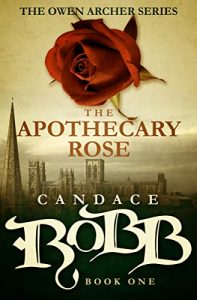 This latest entry in the Owen Archer series is wrapped around Archer’s past. The past when he was a captain of archers for the Duke of Lancaster and was betrayed by one of his own men. A betrayal which resulted in the loss of his left eye and set him on the path readers’ found him on in the first book in the series, The Apothecary Rose.
This latest entry in the Owen Archer series is wrapped around Archer’s past. The past when he was a captain of archers for the Duke of Lancaster and was betrayed by one of his own men. A betrayal which resulted in the loss of his left eye and set him on the path readers’ found him on in the first book in the series, The Apothecary Rose.
In other words, in a peculiar way Owen owes everything he has to this betrayal and the man who arranged it. Owen has succeeded beyond his own wildest dreams, becoming a respected officer and landowner, the confidant of kings and princes, with a beautiful and intelligent wife and several wonderful children by birth and adoption.
Owen has it all – just as it seemed he did, in an entirely different way back when he was still a soldier. And the same man who tried to take it all away – along with Owen’s life – back then has followed him to York to try again.
But this time Owen has hostages to fortune. It’s not just his own life on the line, but the lives of his wife, his children, his friends and his colleagues. He has a lot to live for, and a lot to fight for.
All he has to do is finally get the fox Reynard out of his fold of the city of York without losing anyone he holds dear along the way.
But the case is complicated – as nearly all of Owen’s cases are complicated – by the machinations of the high and mighty. Reynard may be acting on his own, determined to finally best the man he has both envied and hated for all these years.
Or he might be in the pay of someone determined to bring disaster on Owen and on the city of York for political reasons of their own. If Reynard has an influential patron, Owen’s case may be much, much harder to solve.
And possibly even more deadly, and with even more dire consequences than he ever imagined.
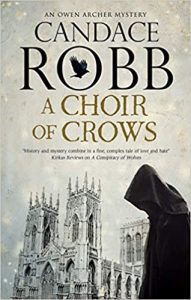 Escape Rating A-: Owen Archer is caught on the horns of multiple dilemmas when this story opens, and he barks up more than a few of the wrong trees before he finally realizes that not just all of the cases that confront him are one but that the instigator of those cases is not at all who he thought it was.
Escape Rating A-: Owen Archer is caught on the horns of multiple dilemmas when this story opens, and he barks up more than a few of the wrong trees before he finally realizes that not just all of the cases that confront him are one but that the instigator of those cases is not at all who he thought it was.
And his confusion and split attention does lead to a bit of the same on the part of the reader until Owen finally manages to focus his one eye on the true threat to his city and to everyone that he holds dear.
What makes the Owen Archer series so fascinating, at least to this reader, is the way that the mysteries he faces touch on both the big and the small. By big, I mean the roiling politics of his time, and by small, I mean the everyday crimes that are the bread and butter of all mystery stories.
This particular mystery at first looks small, a dead cart driver and a missing load of building stones. At first, the biggest part of the mystery seems to be where the stones might have gone. How, exactly does one “fence” or whatever the medieval term might have been, a load of building stones?
But, as with so many of Owen’s cases, the simple opening leads to some dark and twisty alleys – in the streets of York, in Owen’s past, and in the political upheaval yet to come.
King Edward III is going to die in less than a year, after 50 years of ruling England. His Prince of Wales has predeceased him, and his country is going to be left in the hands of a child who will rule (badly) as Richard II. As the old king falters, the jockeying for position on a regency council has already begun – and friends and advisors of the dying Edward are in danger of losing their places and perhaps even their lives in the coming storm.
Owen believes that King Edward’s former Chancellor has brought bad luck to York when he arrives in the midst of what seems to be a pilgrimage of atonement. And he has, but not in the way that Owen thinks. But Owen saw the man as a ‘bird of ill omen’ in A Choir of Crows and is reluctant to change his mind – especially as death has followed in the man’s wake yet again.
Instead, someone from Owen’s past has taken advantage of the visit to strike Owen down one more time. But this fox operates in the shadows, and Owen doesn’t sense the true nature of the threat for almost too long.
So, as with other entries in the series, this mystery begins small but unfolds large – while forcing Owen to look back at who he was and who he is. It gives him the chance to understand that what he once thought would break him was the making of him after all.
One of the things that I love about this entry in the series is the way that it both reflects back on earlier books in the series, particularly the first book, The Apothecary Rose, and the more recent A Choir of Crows while also casting a reflection on events in its period that reflect the present. If historical mystery is your thing, and you haven’t yet walked the streets of Owen Archer’s medieval York, I highly recommend starting this series from the beginning with The Apothecary Rose.
I’m looking forward to the next book in the series, whenever it may appear, because I expect it to cover an event that we’ve just experienced – in pomp and circumstance but diluted actual impact. In our own time, the Queen is dead, long live the King. In Owen’s time, the King will be dead, and the realm will be in for one hell of a mess.

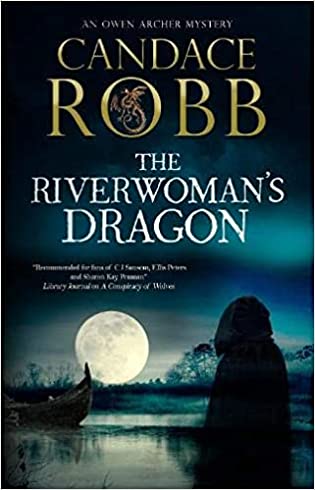 The Riverwoman's Dragon by
The Riverwoman's Dragon by 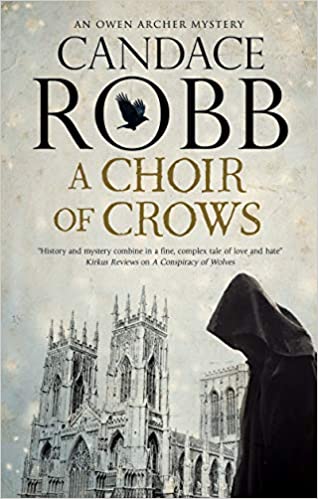 A Choir of Crows (Owen Archer, #12) by
A Choir of Crows (Owen Archer, #12) by 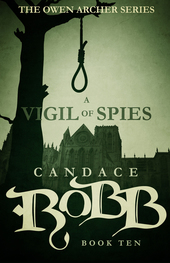 The young woman at the heart of this mystery is a victim every bit as much – actually as it turns out quite a bit more – than the man who was murdered. But she’s all too aware that even though none of what happened is in any way her fault, she’ll still be blamed for all of it merely because she is female. And that hasn’t changed much either.
The young woman at the heart of this mystery is a victim every bit as much – actually as it turns out quite a bit more – than the man who was murdered. But she’s all too aware that even though none of what happened is in any way her fault, she’ll still be blamed for all of it merely because she is female. And that hasn’t changed much either.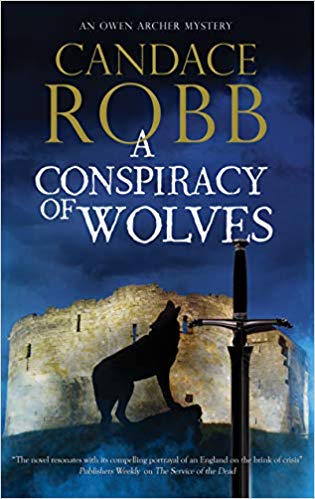 A Conspiracy of Wolves (Owen Archer #11) by
A Conspiracy of Wolves (Owen Archer #11) by 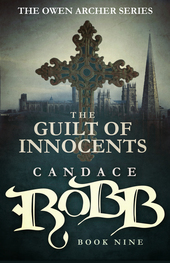 The story in this 10th book in the
The story in this 10th book in the 
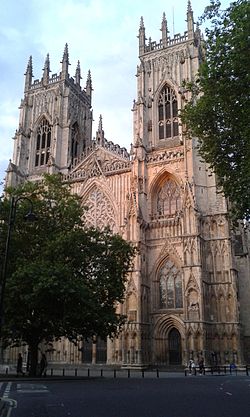
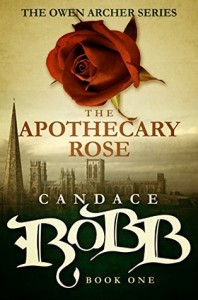 Owen makes an interesting and effective investigator. While he moves within all of these worlds, he is not a part of any of them. He is a soldier, but he works for the church. His wife is a respected master in the city, but he is not a member of any of the craft guilds. For a one-eyed man, he sees very clearly indeed. And because he is not partial to any of the groups involved, he is able to trace a clear path to the real killer without being blinded by shared interests or family ties.
Owen makes an interesting and effective investigator. While he moves within all of these worlds, he is not a part of any of them. He is a soldier, but he works for the church. His wife is a respected master in the city, but he is not a member of any of the craft guilds. For a one-eyed man, he sees very clearly indeed. And because he is not partial to any of the groups involved, he is able to trace a clear path to the real killer without being blinded by shared interests or family ties.